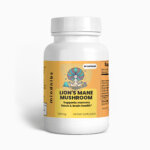
“Powerful Probiotics: How Supplements Support Your Gut Health”
Are you looking for a way to improve your gut health? The answer may lie in incorporating powerful probiotics into your daily routine. These supplements contain beneficial bacteria that can help support your digestive system, boost your immune system, and even improve your mental health. In this article, we’ll explore the various types of probiotics available, how they work, and why you should consider adding them to your diet. Get ready to learn how these tiny microbes can have a big impact on your overall wellbeing.
1. The Importance of Gut Health
Gut health refers to the balance, functionality, and diversity of your gut microbiota, which are the microorganisms – bacteria, viruses, and fungi – that live in your digestive tract. Maintaining a healthy gut microbe population is crucial for overall health and wellness because these microorganisms play a significant role in digestion, nutrient absorption, immune function, and even mental health.
Poor gut health can contribute to a variety of health issues, including gastrointestinal problems like bloating, constipation, and diarrhea, as well as disorders such as inflammatory bowel disease, allergies, autoimmune diseases, and even depression and anxiety. Therefore, it’s essential to maintain a healthy gut balance that can be achieved through a combination of a nutrient-rich diet, regular exercise, proper hydration, and adequate sleep.
- Eating a variety of whole foods with high fiber content, such as whole grains, fruits, vegetables, nuts, and seeds can help promote bacterial diversity in your gut.
- Consuming fermented foods that contain live cultures, such as yogurt, kefir, sauerkraut, kimchi, and kombucha, can help increase the number of beneficial bacteria in your gut.
- Reducing or avoiding processed foods, sugar, and artificial sweeteners can also support a healthy gut balance, as these types of foods act as fuel for harmful bacteria.
To sum up, maintaining gut health is essential for overall health and well-being. A balanced and diverse gut microbiome can benefit digestion, immune function, mental health, and prevent various diseases. Therefore, making dietary and lifestyle changes that support your gut health should be a priority to maintain a healthy gut balance and a healthy life.

2. Understanding Probiotics: What They Are and How They Work
Probiotics are live microorganisms that provide health benefits when consumed in adequate amounts. The word “probiotic” comes from Greek and means “for life.” Probiotics have been studied extensively for their potential to support health in many ways. These beneficial bacteria can be consumed in many forms, including food and supplements.
Probiotics work by colonizing the gut microbiome, which is the collection of microorganisms that live in the digestive tract. They help to maintain a healthy balance of bacteria in the gut, which is critical for overall health. This balance can be disrupted by many factors, including a poor diet, stress, and the use of antibiotics, which can kill off beneficial bacteria along with harmful ones. When this balance is disrupted, it can lead to many health problems.
Probiotics have been shown to support digestive health, immune function, and even mental health. Some specific strains of probiotics have been studied for their ability to help with specific health conditions, such as irritable bowel syndrome (IBS) and inflammatory bowel disease (IBD). While the research on probiotics is still evolving, there is a growing body of evidence to suggest that they have many health benefits.
- Key Takeaways:
- Probiotics are live microorganisms that provide health benefits when consumed in adequate amounts.
- Probiotics work by colonizing the gut microbiome and maintaining a healthy balance of bacteria in the gut.
- Probiotics have been shown to support digestive health, immune function, and even mental health.

3. The Benefits of Probiotic Supplements for Your Digestive Health
Probiotic supplements can be incredibly beneficial for your digestive health. Here are some of the benefits of including probiotics in your diet:
– Improved digestion: Probiotics are live microorganisms that can help break down food in your stomach and small intestine. They can improve the absorption of nutrients and reduce bloating, gas, and constipation.
– Boosted immunity: Probiotics can stimulate the production of antibodies and boost the function of immune cells in your gut. This can help your body fight off harmful bacteria and viruses.
– Reduced inflammation: Some studies have shown that probiotics can reduce inflammation in your gut, which can benefit people with conditions like irritable bowel syndrome (IBS) or inflammatory bowel disease (IBD).
If you are interested in trying probiotic supplements, it is important to choose a high-quality option that contains strains of bacteria that have been scientifically proven to offer health benefits. Look for a supplement that has a high CFU (colony-forming unit) count and includes a variety of different strains of beneficial bacteria.
Keep in mind that probiotics may not be a suitable option for everyone. If you have a weakened immune system or are taking medication that affects your immune system, talk to your doctor before taking any supplements. Additionally, probiotics are not a replacement for a healthy diet and lifestyle, and should be used in conjunction with other healthy habits.
4. How Probiotic Supplements Can Boost Your Immune System
Probiotic supplements have become increasingly popular for their potential health benefits. While many people use them to improve digestion and gut health, they can also have significant benefits for the immune system. In this section, we explore and the evidence behind these claims.
Firstly, probiotics can help to balance the microflora in your gut, which can be crucial for immune function. When the gut microbiome is disrupted, this can impact the immune system’s ability to function correctly. By introducing beneficial bacteria through probiotics, you can restore balance and support the immune system. Studies have shown that taking probiotic supplements can help to increase the production of natural antibodies and improve the activity of immune cells. [1]
Secondly, probiotics can help to strengthen the gut barrier, which is essential for preventing the entry of harmful pathogens. The lining of the gut acts as a barrier to keep out unwanted particles, including bacteria and viruses. When the barrier is compromised, it can lead to inflammation and chronic disease. Studies have found that probiotics can strengthen the gut lining, reducing inflammation and improving immune function. [2]
Lastly, certain strains of probiotics have been shown to have specific immune-boosting properties. For example, Lactobacillus acidophilus has been found to stimulate the production of immunoglobulin A, which helps to protect against viruses and bacteria in the respiratory tract. Bifidobacterium bifidum has also been shown to reduce inflammation and improve immune function in older adults. When choosing a probiotic supplement, it’s essential to consider the specific strains and their immune-boosting properties. [3]
In conclusion, probiotic supplements can provide numerous benefits for the immune system. By restoring balance to the gut microbiome, strengthening the gut barrier, and introducing specific immune-boosting strains, you can support your body’s ability to fight off infections and diseases. When considering probiotics as a supplement, it’s important to choose high-quality products that contain beneficial strains and to consult with a healthcare provider to determine the best options for your individual needs.
5. Natural Sources of Probiotics: Foods that Can Enhance Your Gut Health
Eating probiotic-rich foods is an excellent way to boost your gut health naturally. These foods are filled with good bacteria that are essential for improving digestion, immunity, and nutrient absorption. Here are five natural sources of probiotics that can help you reap the benefits of probiotics.
1. Fermented Vegetables
Fermented vegetables are an excellent probiotic source that is easy to add to your meals. Sauerkraut, Kimchi, and pickles are a few examples of fermented vegetables that are rich in lactobacilli and promote a healthy gut. You can use them as a salad topping, sandwich filling, or eat them as a side dish daily.
2. Yogurt
Yogurt is one of the most popular probiotic sources worldwide. It is made by fermenting milk with probiotics such as Lactobacillus bulgaricus and Streptococcus thermophilus. Greek yogurt, kefir, and skyr are some variations that contain other probiotics and are widely available in supermarkets.
3. Kombucha
Kombucha is a fermented tea drink that has become increasingly popular in recent years. It is made by adding probiotic cultures to sweetened tea and leaving it to ferment. Kombucha contains probiotics, antioxidants, and organic acids that improve gut health and overall wellness. You can consume it as a refreshing drink in the morning or as an afternoon boost.
In conclusion, consuming probiotic-rich foods is a simple and effective way to improve your gut health. Incorporating natural sources such as fermented vegetables, yogurt and kombucha can enhance digestive function, promote nutrient absorption, and boost overall immune function. Consider trying out these natural probiotics in your diet and take advantage of the various health benefits they offer.
6. Finding the Right Probiotic Supplement for Your Needs
—
Probiotic supplements are becoming increasingly popular all over the world, and for good reason. They offer a natural, effective way to promote digestive health, support the immune system, and even help with mood and mental health. However, not all probiotics are created equal, and finding the right supplement for your needs can be a challenge.
Here are some tips to help you find the perfect probiotic supplement:
– Look for strains that are proven to be effective. Different strains of bacteria offer different benefits, so it’s essential to do your research to find out which ones align with your specific needs. Some of the most popular strains include Lactobacillus acidophilus, Bifidobacterium bifidum, and Streptococcus thermophilus.
– Check the CFUs (colony forming unit) count. This indicates the number of live bacteria in each serving. Generally, you’ll want to look for a supplement with at least 10 billion CFUs per serving, although this can vary depending on your needs.
– Choose a reputable brand. Unfortunately, the supplement industry is not regulated in the same way as prescription drugs, so there are many low-quality products out there. Look for a brand that has positive reviews, uses high-quality ingredients, and is transparent about their manufacturing process.
By following these tips, you can ensure that you choose a probiotic supplement that is effective, safe, and tailored to your unique needs. Remember, not all probiotics are created equal, so it’s worth taking the time to do your research before making a purchase.
7. Incorporating Probiotic Supplements into Your Daily Routine: Tips and Tricks
Probiotic supplements are a great way to improve your overall gut health, but figuring out how to incorporate them into your daily routine can be tricky. Here are some tips and tricks to make taking probiotics a seamless part of your daily routine:
1. Choose a time of day that works for you: Whether you prefer to take your probiotic supplement in the morning, with breakfast, or before bed, make sure to choose a time that works best for you and stick to it. This will make it easier to remember to take your supplement every day.
2. Keep your probiotics visible: To make sure you don’t forget to take your probiotic supplement, keep them in a visible location in your home. This can be on your kitchen counter, bathroom countertop, or bedside table. Seeing your probiotics every day will serve as a constant reminder to take them.
3. Try different forms and brands: If you don’t like taking pills, there are other forms of probiotics available, such as gummies, powders, and liquids. Additionally, different brands may have varying strains and potencies, so it’s important to try different brands until you find one that works best for you.
Incorporating probiotic supplements into your daily routine doesn’t have to be complicated or overwhelming. Just remember to find a time that works for you, keep your supplements visible, and try different forms and brands until you find one that you enjoy taking. By making probiotics a regular part of your routine, you’ll be well on your way to improving your gut health and overall well-being.
In sum, taking probiotics can be an effective way to support gut health in the face of modern lifestyle and dietary habits. With consistent use, these powerful probiotics can help to restore balance in the microbiome. Ultimately, this probiotic support can mitigate inflammation, promote better nutrient absorption, and improve overall gut health and wellness.

























